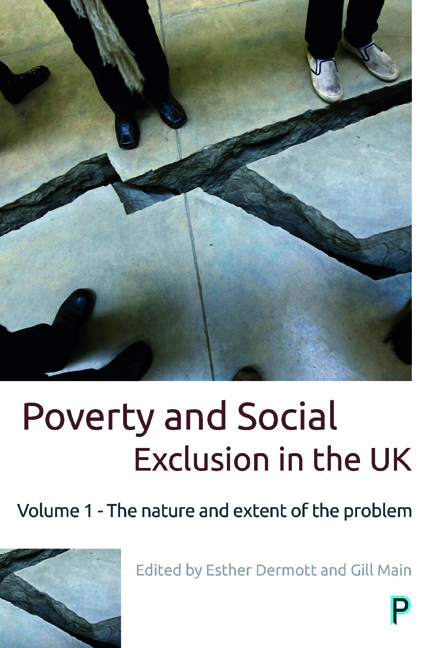Book contents
- Frontmatter
- Dedication
- Contents
- List of tables and figures
- Notes on contributors
- Acknowledgements
- Introduction: poverty and social exclusion in the UK
- One Measuring poverty in the UK
- Two The impoverishment of youth: poverty, deprivation and social exclusion among young adults in the Uk
- Three Improvement for some: poverty and social exclusion among older people and pensioners
- Four Which men and women are poor? Gender, poverty and social exclusion
- Five Better understandings of ethnic variations: ethnicity, poverty and social exclusion
- Six Improving lives? Child poverty and social exclusion
- Seven The cost of children: parents, poverty, and social support
- Eight A worsening picture: poverty and social exclusion and disabled people
- Nine Devolution and North/South division: poverty and social exclusion in the countries and regions of the UK
- Ten More similarities than differences: poverty and social exclusion in rural and urban locations
- Conclusion: innovating methods, informing policy and challenging stigma
- Technical appendix
- Index
One - Measuring poverty in the UK
Published online by Cambridge University Press: 08 April 2022
- Frontmatter
- Dedication
- Contents
- List of tables and figures
- Notes on contributors
- Acknowledgements
- Introduction: poverty and social exclusion in the UK
- One Measuring poverty in the UK
- Two The impoverishment of youth: poverty, deprivation and social exclusion among young adults in the Uk
- Three Improvement for some: poverty and social exclusion among older people and pensioners
- Four Which men and women are poor? Gender, poverty and social exclusion
- Five Better understandings of ethnic variations: ethnicity, poverty and social exclusion
- Six Improving lives? Child poverty and social exclusion
- Seven The cost of children: parents, poverty, and social support
- Eight A worsening picture: poverty and social exclusion and disabled people
- Nine Devolution and North/South division: poverty and social exclusion in the countries and regions of the UK
- Ten More similarities than differences: poverty and social exclusion in rural and urban locations
- Conclusion: innovating methods, informing policy and challenging stigma
- Technical appendix
- Index
Summary
‘While our population during the last century increased three and a half times, the wealth of the community increased over six times. But one factor in our national life remained with us all through the century, and is with us still, and that is that at the bottom of the social scale there is a mass of poverty and misery equal in magnitude to that which obtained 100 years ago. I submit that the true test of progress is not the accumulation of wealth in the hands of a few, but the elevation of a people as a whole.’ (Keir Hardie, Labour Party leader, House of Commons, 23 April 1901)
‘The word poor is one the government actually disputes.’ (Mr Hickey, DHSS Assistant Secretary for Policy on Family Benefits and Low Income, Evidence to House of Commons Social Security Select Committee, 15 September 1989)
‘Where is the fairness, we ask, for the shift-worker, leaving home in the dark hours of the early morning, who looks up at the closed blinds of their next door neighbour sleeping off a life on benefits? When we say we’re all in this together, we speak for that worker. We speak for all those who want to work hard and get on.’ (George Osborne, Chancellor, 8 October 2012)
‘That means fighting against the burning injustice that if you’re born poor you will die on average nine years earlier than others. If you’re black, you’re treated more harshly by the criminal justice system than if you’re white. If you’re a white working class boy, you’re less likely than anybody else in Britain to go to university. If you’re at a state school, you’re less likely to reach the top professions than if you’re educated privately. If you’re a woman, you will earn less than a man. If you suffer from mental health problems, there's not enough help to hand. If you’re young, you’ll find it harder than ever before to own your own home…. The Government I lead will be driven, not by the interests of the privileged few, but by yours.’ (Theresa May's first speech as Prime Minister, 13 July 2016)
Introduction: the political context
Poverty in the UK is a strange phenomenon, as the quotes above demonstrate.
- Type
- Chapter
- Information
- Poverty and Social Exclusion in the UK Vol 1The Nature and Extent of the Problem, pp. 17 - 40Publisher: Bristol University PressPrint publication year: 2017
- 2
- Cited by



